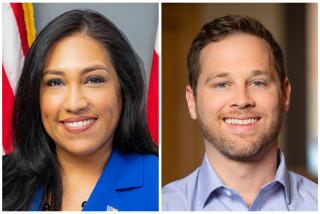Golding Takes Key Step Toward Senate Race
San Diego Mayor Susan Golding tiptoed Monday into the race for U.S. Senate, ending months of hesitation by forming an exploratory committee as a first step toward challenging incumbent Democratic Sen. Barbara Boxer.
The low-key announcement, made via press release, makes for the third announced or all-but-announced Republican candidate lining up to face Boxer next year. State Treasurer Matt Fong has been aggressively campaigning for weeks, and San Diego County businessman Darrell Issa, a major Republican Party donor little-known outside GOP circles, announced his candidacy earlier this month.
Golding’s entry into the race had been expected for some time, even before she boosted her political stock with a poised turn as host of last summer’s Republican National Convention in San Diego. But Golding equivocated at great length--to the utter frustration of supporters--in part because of a court fight over the expansion of the city’s Jack Murphy Stadium.
In late February, a judge dismissed a lawsuit that would have blocked the renovation, clearing the way for Golding’s potential political advancement.
Her seven-paragraph announcement Monday was in keeping with the careful, deliberate political style of the 51-year-old mayor, who won reelection last year with 78% of the vote. For all her abundant caution, however, Golding is the candidate that Boxer’s strategists say they fear most. She is moderate on social issues, performs well on television and boasts many of the advisors who launched Pete Wilson from San Diego City Hall to the U.S. Senate in 1982.
“She’s going to be a formidable competitor,” said Samuel Popkin, a UC San Diego political scientist and longtime Golding watcher. “She really is a serious moderate who can talk about a lot of issues. She never bought into the crazy side of Wilson and his anti-border rhetoric. She never got caught up in religious craziness. She’s Tom Campbell in a skirt.”
Campbell, the Republican congressman from San Jose, and a widely touted centrist, sought the 1992 GOP Senate nomination but lost in the primary to the more conservative Bruce Herschensohn--who then lost to Boxer. Like him, Golding will face a stiff fight within her own party before she can advance to the general election.
Unlike Campbell, however, she may benefit from the state’s new open-primary law, which would allow voters to choose among all candidates on the ballot, regardless of party registration. The law, being challenged in court by the two major parties, could strengthen moderate candidates like Golding by weakening the influence of more ideological voters.
Golding strategists are counting especially on her appeal to women voters, who have deserted the Republican Party in recent years in droves. “Golding’s nomination would minimize or eliminate the gender gap,” said consultant Tom Shepard.
The Boxer camp’s reaction to Golding’s announcement was studiously blase. “Yesterday, the Republican field consisted of two candidates nobody had heard of,” said spokesman Roy Behr. “Today, it consists of three.”
More to Read
Get the L.A. Times Politics newsletter
Deeply reported insights into legislation, politics and policy from Sacramento, Washington and beyond. In your inbox three times per week.
You may occasionally receive promotional content from the Los Angeles Times.











